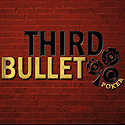The Way of the Shark or Kung Fu Poker
Once again in this article I`m taking you to the mystic east to try and make you look at our favourite game in a different light. In many respects this article is aimed more at the beginner but hopefully even the more experienced players amongst you will find some food for thought contained within it. I`m going to have to apologise for a slightly misleading title, I know very little about kung fu other than it means practiced skill (and therefore could be applied to poker). I have studied the martial arts but I practiced ju-jitsu, however I thought kung fu would be a far more familiar martial art to mention and quite frankly a better title for this article.
So why compare the two disciplines? At first glance there is very little about poker that relates to the martial arts. One involves hard physical training the other requires long hours sat at a table or in front of a monitor. Well the most obvious similarity is discipline. If you want to be good at either you`re going to have to practice and the more you practice the better you should get. In the martial arts your fitness, strength and dexterity are areas you should work on. In poker the majority of the work you do is going to be on your concentration and reading abilities. However even in poker physical fitness can be an advantage. Many of the top professionals keep themselves physically fit because it`s been proved that the fitter you are the better you are able to maintain concentration. For most of us that play for a couple of hours a day at home this isn`t going to have a huge effect. However if you`re intending to sit at a tournament or ring table for 12+ hours it`s worth considering.
What I really want to talk about is the process of learning and this is where I feel the major similarity between poker and the martial arts lies. When I attended my first ju-jitsu class I didn`t learn one-handed throat throw as my first technique (yes there really is one, and it`s just as nasty as it sounds), I learnt how to land from a throw, I learnt the basics of kicks and punches and how to stand. The same applies to poker, before you can learn those expert plays you see the pros make you need to master the basics. If you`re a beginner you really don`t want to be raising from middle position with 7-8 suited, you`re just going to get yourself into trouble most of the time. Stick to the basics, the top ten or twenty hands until you have a solid grasp on what you`re doing and more importantly why you`re doing it. That really is a key point of this game, you should always have a reason for every action you take. If you raise, bluff, check, limp,fold, re-raise, check-raise, smoothcall, all-in, make sure you know why and that you`re selecting the best technique/play at that time. The cards you choose to play are in effect the techniques the martial artist uses in sparring and you need to practice to perfect those
Even the way we choose to play has comparisons with the martial arts. A loose- aggressive player style could be comparable with someone who practiced a hard external style (Hard or external styles rely heavily on strikes, using force to overcome an opponent. Soft or internal martial arts concentrate more on defense and use throws and locks to disable an opponent using his own strength against him) like Wing Chun whilst a tight style of play probably compares better with something like Akido, defensive but just as effective. However as poker is a game of deception where we often rely on the mistakes of others to profit it is best to mix up our style to keep our opponent off balance, in other words we want to practice a hard/soft style where we can choose to either attack or defend with equal effectiveness.
Sticking with my martial arts analogy you`re progressing through the grades, from white belt to yellow, from yellow to green, from green to blue etc. As you progress through the grades you`re learning to play different hands and use different plays just as a martial artist learns different techniques as they progress through the grading system. Be patient, you can`t learn it all in a day, week, month or even a year. One day if you practise enough you`re going to be a black belt or in poker terms a shark. However just as in the martial arts once you`ve reached those lofty heights you`re going to realise that far from knowing everything about the game you`re really only just beginning. Doyle Brunson says he learns something new everytime he plays and he`s been playing for over fifty years. If it`s true for a legend like him then it`s certainly true for all of us.
So why compare the two disciplines? At first glance there is very little about poker that relates to the martial arts. One involves hard physical training the other requires long hours sat at a table or in front of a monitor. Well the most obvious similarity is discipline. If you want to be good at either you`re going to have to practice and the more you practice the better you should get. In the martial arts your fitness, strength and dexterity are areas you should work on. In poker the majority of the work you do is going to be on your concentration and reading abilities. However even in poker physical fitness can be an advantage. Many of the top professionals keep themselves physically fit because it`s been proved that the fitter you are the better you are able to maintain concentration. For most of us that play for a couple of hours a day at home this isn`t going to have a huge effect. However if you`re intending to sit at a tournament or ring table for 12+ hours it`s worth considering.
What I really want to talk about is the process of learning and this is where I feel the major similarity between poker and the martial arts lies. When I attended my first ju-jitsu class I didn`t learn one-handed throat throw as my first technique (yes there really is one, and it`s just as nasty as it sounds), I learnt how to land from a throw, I learnt the basics of kicks and punches and how to stand. The same applies to poker, before you can learn those expert plays you see the pros make you need to master the basics. If you`re a beginner you really don`t want to be raising from middle position with 7-8 suited, you`re just going to get yourself into trouble most of the time. Stick to the basics, the top ten or twenty hands until you have a solid grasp on what you`re doing and more importantly why you`re doing it. That really is a key point of this game, you should always have a reason for every action you take. If you raise, bluff, check, limp,fold, re-raise, check-raise, smoothcall, all-in, make sure you know why and that you`re selecting the best technique/play at that time. The cards you choose to play are in effect the techniques the martial artist uses in sparring and you need to practice to perfect those
Even the way we choose to play has comparisons with the martial arts. A loose- aggressive player style could be comparable with someone who practiced a hard external style (Hard or external styles rely heavily on strikes, using force to overcome an opponent. Soft or internal martial arts concentrate more on defense and use throws and locks to disable an opponent using his own strength against him) like Wing Chun whilst a tight style of play probably compares better with something like Akido, defensive but just as effective. However as poker is a game of deception where we often rely on the mistakes of others to profit it is best to mix up our style to keep our opponent off balance, in other words we want to practice a hard/soft style where we can choose to either attack or defend with equal effectiveness.
Sticking with my martial arts analogy you`re progressing through the grades, from white belt to yellow, from yellow to green, from green to blue etc. As you progress through the grades you`re learning to play different hands and use different plays just as a martial artist learns different techniques as they progress through the grading system. Be patient, you can`t learn it all in a day, week, month or even a year. One day if you practise enough you`re going to be a black belt or in poker terms a shark. However just as in the martial arts once you`ve reached those lofty heights you`re going to realise that far from knowing everything about the game you`re really only just beginning. Doyle Brunson says he learns something new everytime he plays and he`s been playing for over fifty years. If it`s true for a legend like him then it`s certainly true for all of us.



0 Comments:
Post a Comment
<< Home